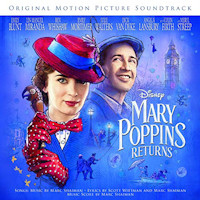- Songs by Marc Shaiman and Scott Whitman
- Score by Marc Shaiman
- Disney / 79m
A belated sequel to Mary Poppins was probably not on anyone’s wish list, but Disney has been trawling through its archives recently making films that probably weren’t on anyone’s wish list and making tonnes of money in the process. (Next year we get Dumbo, Aladdin and The Lion King.) It’s actually been received very well, with Emily Blunt stepping into Julie Andrews’s shoes as the eponymous nanny and (carefully avoiding the original’s casting of an American trying to do a Cockney accent) Lin-Manuel Miranda as Jack, former apprentice of Bert from the original film.
Of all the Sherman Brothers’ wonderful musical work for Disney, perhaps their most iconic was indeed Mary Poppins, so Marc Shaiman had quite some shoes to fill when it came to providing the score this time round; he co-wrote the songs with Scott Whitman and also did the score. It’s nice to hear something new from him – his film work has become considerably more occasional since the spectacular success of his stage version of Hairspray – and he’s done a fine job in balancing tips of the hat to the original with new music in the same style, and his own twists.

The album gets going with “(Underneath the) Lovely London Sky” sung by Miranda, a pleasant enough song with a lovely central tune; then we get an old-fashioned orchestral “Overture” which summarises several of the new song melodies and is a joyous little treat. After this, the remaining songs are played consecutively.
“A Conversation” is a charming song full of nostalgia (not unlike Richard Sherman’s songs from Christopher Robin earlier this year, in fact); then we get the first one sung by Blunt, “Can You Imagine That?”, which is a jolly little ditty. She takes the lead again in “The Royal Doulton Music Hall” which – in common with many of the songs – could have been written sixty years ago. The same tune is then heard by the orchestra under dialogue in “Introducing Mary Poppins” before the showstopping “A Cover is Not the Book” which will get lots of feet tapping away.
My favourite of the songs is the gorgeous, whimsical “The Place Where Lost Things Go” – an absolute belter of a number with a super tune and charming lyrics. The comedic “Turning Turtle” doesn’t do much for me but then we get the wonderful “Trip a Little Light Fantastic”, the centrepiece really and the one I imagine most likely to stick in people’s memories afterwards (at times the melody verges closely towards the Shermans’ “A Spoonful of Sugar”). Its exuberance is quite contagious, and I imagine will bring smiles to many faces.
Brief reprises of “The Place Where Lost Things Go” and “Trip a Little Light Fantastic” (the latter featuring – wonderfully – Dick Van Dyke) lead into another excellent song, “Nowhere to Go But Up”, which features Angela Lansbury (who at 93 is even older than Van Dyke but sounds exactly the same as she always has) and is a real charmer, featuring a little quote of “Let’s Go Fly a Kite”.
The song section ends with a reprise of “(Underneath the) Lovely London Sky” before the same melody is then heard in orchestral form, packaged as “Theme From Mary Poppins Returns” which introduces the score section of the album (and is actually a very beautiful arrangement). As you’d expect, Shaiman packs in plenty of quotes of his songs into the score, along with a few references to music from the original.
It’s a pretty varied score, really – we go straight into the boisterous “Kite Takes Off”, with grand orchestral gestures; the main melodic content is the same as the previous two cues and it’s clear that Shaiman is very much using it as the main theme when it appears again – in lighter form this time – in “Mary Poppins Arrives”, along with a brief burst of “A Spoonful of Sugar”.
Score highlights include the brief but delightful scherzo “Banks in the Bank”; the serious, heavy-duty action of “Rescuing George” (Shaiman showing just what a fine film composer he is, with a very different style from the one for which he is now famous); the lilting “Goodbye Old Friend”; another action-packed track, “Race to Big Ben” (which makes great use of the “Trip a Little Light Fantastic” melody); and a nice (mostly) orchestral end credits piece.
Writing music for a project like Mary Poppins Returns – having to “compete” with the classic songs – could have been a thankless task, but Shaiman and Whitman clearly threw their all into it (and there’s no reason to think they wouldn’t have done). Inevitably, every time you hear a bit of Sherman Brothers you are reminded of just how wonderful their music was – and however good it is (and it is good), the new material can’t really compete with that. Still, expect this music to figure prominently in most of the end-of-year awards – some of the songs are terrific and the score is generally delightful. The one thing I would say is – for all that’s good about it, I’m not sure it quite sticks in the memory the way Shaiman’s best work (either sung or not) does – part of that’s the unavoidable Sherman comparison, which was always going to be difficult. Still, it’s a fine piece of work (and it would be lovely to hear a bit more from Shaiman in terms of film music). It’s a hard one to give a rating for because on its own terms it’s really very impressive; it’s just one of those things that’s so hard to consider purely on its own terms.
Rating: *** 1/2
facebook.com/moviewave | twitter.com/MovieWaveDotNet | amazon.com












It‘s quiet in here! Why not leave a response?